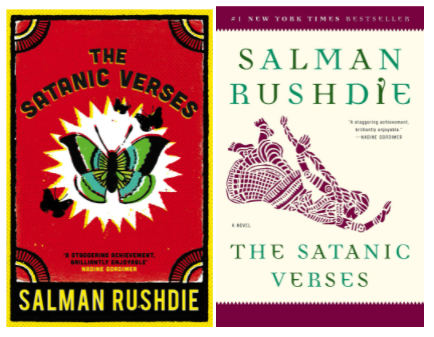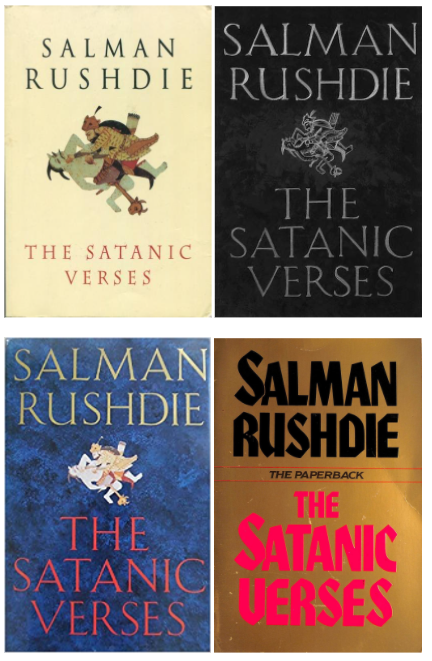By: María Hawthorne
Plot Summary
The novel surrounds two men, Gibreel Farishta and Saladin Chamcha. Both men meet on a plane on their way to England. An explosion goes off in the plane and they are the only two survivors. While they fall, Gibreel turns into the angel Gabriel and Saladin turns into the devil. While they fall, Gibreel has a series of dreams. One of the dreams is a retelling of the story of Muhammad, many people were very offended by the fact that Rushdie named prostitutes after Muhammad’s wives. Another one of his dreams happens later on and is a parallel to the story of Jesus, except it is a young girl named Ayesha. In the end, many people die and her prophecy turns out to be wrong. When she claims the seas will part, they do not and everyone drowns. When Gibreel and Saladin find land, Saladin’s life begins to go terribly. He is arrested as soon as he reaches land and then loses his job and his wife cheats on him. Gibreel’s life, however, improves greatly. He is reunited with the woman he loves and a film director recruits Gibreel for a movie he is making. Saladin grows to hate Gibreel and wants to kill him, but despite having the opportunity to, he does not, but rather tells Gibreel that the woman he loves is seeing other people. Gibreel figures out that Saladin lied, and plans to kill him but ends up saving his life. The two men return separately to Bombay, where Saladin makes up with his father, inherits a large sum of money, and unites with a previous girlfriend. Gibreel, ends up murdering his girlfriend in a fit of jealous rage and then kills himself.

Themes
The two main themes of the novel are Religion, and the idea of good and evil. While Gibreel and Saladin fall from the plain, they are both turned into well known religious figures, an angel and a devil. With these two figures, we also immediately begin the discussion of good and evil. The angel is seen as a benevolent and good person, and when Gibreel finds land he is treated as such. The devil is seen as cruel and evil, so when Saladin reaches land he is detained and then followed by many misfortunes. Rushdie seems to imply that these binaries of good and evil are not accurate. He creates several characters, like Allie and Pamela, that don’t follow these binaries. Gibreel and Saladin even break these molds in the end when Gibreel commits the terrible act of killing himself and Allie, while Saladin is able to make amends with his father and live happily.
Publishing and Censorship History
The Satanic Verses was first published in 1988. It was Rushdie’s fourth book and gained a lot of positive and negative attention. The novel won the Whitbread novel of the year award in 1988 and was a finalist for the 1988 Booker Prize. Sadly, the novel’s excellence was often overshadowed by the controversy that surrounded it. The Satanic Verses was banned in many countries, but the most notable banning was done in Iran. The novel was seen as blasphemous by most Muslims because Rushdie used Islam in a satirical way. Because of this outrage, Ayatollah Ruhollah Khomeini issued a fatwa against Rushdie. The fatwa is a ruling given by a mufti, someone who is a qualified legal scholar. The purpose of fatwas is that they are meant to regulate information about a Islam. The fatwa was issued in 1989, and people were encouraged to kill Rushdie along with all of his editors and publishers. Rushdie had to go into hiding and was under police protection for 9 years. In 1998 Ayatollah Ruhollah Khomeini claimed that the government of Iran no longer wanted anyone to kill him.
About the Author
Salman Rushdie was born June 19, 1947, in India, but then became a British-based writer. He was educated at Cambridge University and worked as a copywriter for most of his life. Many of his novels deal with heavy religious and political topics that tend to create a great deal of controversy. He published his first novel in 1975 and published two more novels in 1981 and 1983 before publishing The Satanic Verses. While in hiding Rushdie published four more books, Haroun and the Sea of Stories, Imaginary Homelands, East West, and The Moor’s Last Sigh in 1990, 1991, 1994, and 1995 respectively. After the government of Iran removed the fatwa, Rushdie recounted his experience in hiding under the alias of Joseph Anton. Since then he has written and published 30 other books.

Further Reading